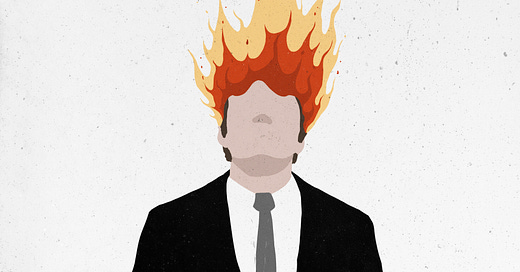Weekend reads: The rage against the machine
Nothing works anymore, everyone is mad - and our society is a pile of kindling waiting for a match. (Plus, Ricky Gervais saves the day in Toronto.)
Late last month, my bank mistakenly flagged my credit card as lost and froze my account, and my regular payments started getting declined. The card was not lost — it was, in fact, sitting safely in my wallet — and when I called the bank (read: the overseas call centre) to inform them of this fact, they acknowledged that they had no record of me calling in to report the card lost. The problem, they told me, was that it was flagged as lost in the system, which apparently was an irreversible action. I had to visit the branch, they said. So I took myself to the branch, but they couldn’t help either and referred me back to the call centre. Eventually, a very kind bank teller offered to phone the call centre on my behalf, and the end result was that my card was cancelled and a new one sent out, to arrive at some indefinite point in the future. In the meantime, I had to call every vendor that I deal with and provide a different card, and/or log on to all my online accounts — which I had inevitably forgotten passwords for — and manually update the payment info. There was no recourse, and no other choice but to follow these instructions, wasting hours of my time.
If you tuned out reading the above paragraph, I don’t blame you. This type of kvetching is as pointless as it is unoriginal. Getting lost in a labyrinth of broken systems is now a staple of modern life, an utterly mundane occurrence that we’ve all become accustomed to.
Everything is broken. We know this.
We know that luggage will get lost and flights will get delayed. That public transportation will be slow, and crowded, and possibly unsafe. That city construction projects will not stick to schedule. That calling a bank, or a cell phone provider, or a cable company, or the government will mean spending an entire morning on hold.
We know that medical appointments will be hard to secure and apartments difficult to rent, and that we will have to wait in long lines for the privilege of paying plenty of our hard-earned cash to multinational mega-corporations, in exchange for unhealthy food or poorly-made clothing (and we may even have to check ourselves out and bag our own goods, too).
We know that everything is scarce — from daycare spots to parking, from jobs to money, from friendship to potential mates, from time with family to the mental health care we all increasingly need to treat our distress.
We know, too, that there is no reasonable amount of income that will entirely insulate us from this avalanche of stress. From the relentless parade of frustrations, large and small.
Dysfunction is now the water that we all swim in.
Our societal decline manifests itself in the toasters that have to be replaced every year. In our infrastructure, with traffic snarling our streets, choking the lifeblood from our cities and fuelling anger and aggression. In our art, which is now so mind-numbingly dull and dogmatic that it actually detracts from life rather than affirming it.
The decline manifests in our tragic opioid crisis, which is imperilling far too many family and friends and neighbours. It manifests in our media, which can no longer summon the will to perform its basic function of holding powerful institutions to account, or in some instances, even reflecting reality. And it manifests in our politics, which is becoming ever-more ferocious and irrational.
So, I’ve started asking everyone I know: Why are things such a mess?
Now I ask you this, too.
Reader, why are things so broken? Is it because our society has become so economically unequal? Is it because corporations have too much power? Is it because every last good or service is now evaluated strictly by the sole metric of profit? Is it because neoliberalism has starved the public square of much-needed resources?
Is it because identitarian moralism is dividing us into warring camps, hampering our ability to come together, and distracting us from deteriorating material conditions?
Is it because of social media?
Is it because we’ve lost our belief in pursuing the common good? Is it because our marriages and families and communities are failing? Is it because we, too, are failing along with them?
Is it because the digital era has rendered our systems hopelessly complex? Is it because these systems are now divided into myriad silos that don’t communicate? Is it because there is no accountability, anywhere, often by design? (Please feel free to offer your own theories in the comments section; I need lots of input on this one.)
Whatever the cause — or more likely, causes — I suspect that we can all agree that this state of affairs is unsustainable.
Thinking this through this past week, I was reminded of a conversation that I had with the Pulitzer Prize-winning journalist Chris Hedges some years ago, for his 2018 outing America: The Farewell Tour. The book documents the decline of America, and sees Hedges touring his country, chronicling disturbing phenomenon ranging from deaths of despair to addictive gambling and the rise of magical thinking. When he and I spoke on the phone that year, I asked Hedges where he saw all of this going.
I don’t see how any of this changes, I told him. People are overwhelmed, struggling to make ends meet and cope with daily life. Who has any time or energy to protest?
Having covered conflicts all over the world, Hedges noted that he’d seen this dynamic before. The masses are busy, they are stressed, they are preoccupied, he said. But eventually enough is enough — and you never know what it is that will spark the unrest. Sometimes it is the most unpredictable of events. An unlikely match comes along and, in an instant, lights the kindling.
This prospect terrifies me.
If you read this newsletter regularly, you know that I would never leave you on such a grim note. So let me tell you another story from this week.
Thursday morning I was out on a long walk with the dog when I bumped into the British comedian Ricky Gervais. By “bumped into” I mean that I spotted him across the street, noticed him smile at my dog, smiled back, and went home. When I got around to Googling why he was in town, it turned out that there were still a few tickets left to his show that night, so a group of us went.
Many of you will know that I am a huge comedy fan. But these days I often find myself disappointed with live comedy, which tends to reinforce the orthodoxies of our age instead of satirizing them — and aims for virtuous applause instead of actual laughs.
But not Thursday night! Not our man Ricky!
His new show, Armageddon, works through the exact tensions that I have just described above — opening with the acknowledgement that “we are on the precipice” — and then, time and time again, provides much-needed release.
Armageddon is a robust defence of free speech, independent thought, and the right to have a sense of humour about the ghastly realities of our age.
There is much hope to be found in speaking the truth about the problems we face. In saying the unsayable. And in poking fun at the absurdities of our age.
It reminded me that the solution to our rising tensions can be found, at least in small part, in collective release. In joy and laughter and a sense of communion. We can, I realized that night, find our way back to each other.
Gervais concluded the show by saying something like, “If being woke means being worried about economic inequality, and racism, and discrimination against gay people, then I’m in. If it means being authoritarians, and policing language, and shutting up other people, then f**k that.” The instant, deafening roar of laughter in the stadium was both a mass recognition of our current reality — that, for instance, the word fascist now means “liking a Joe Rogan tweet,” as Gervais had joked — and a collective affirmation of the values of decency and respect and free thought.
It was enormously heartening. It will keep me going for months to come.
If you’re a fan of comedy, you might also be interested in my interviews with British comics Andrew Doyle (of Titania McGrath fame) and Konstantin Kisin, or my interview with Ben Burgis, author of Canceling Comedians While the World Burns. And while we’re at it, here’s my defence of Dave Chappelle.
Thankfully, I am not the only one ruminating on our society’s brokenness, and I was reminded of this reassuring fact this past week. Two Canadians, Philip and Christina Clark, have launched a new podcast on this very subject, The Broken World. I was honoured to be their first guest. You can listen to that episode here.
In other bright spots, Substack is working hard to build a reader experience that really works for readers. Substack is one of the few systems that I interact with daily that is not broken. Quite the contrary; it has transformed my experience as a journalist, in the best possible way. It stands as an example of the way forward.
Sanity is prevailing elsewhere, too. The feminist Jill Filipovic has published an excellent mea culpa at The Atlantic, “I Was Wrong About Trigger Warnings.” It is highly unusual for anyone in the mainstream media ecosphere to publicly admit that they made a mistake. We salute you, Jill.
In other optimistic news, the wonderful Olivia Reingold has a new essay at The Free Press this week, about reaching out to strangers — and having them reach back. If you want to feel a little bit better about life, about humanity, and about the world in general, I encourage you to read it.
See you all next week!







Here is one suggestion about why things feel broken (are broken): We used to know the people providing our goods and services, and we actively engaged with our goods and services. That provided a measure of accountability, and also we cared more about that accountability. We knew our cashiers. Our parents were friends with their bosses and coworkers, and we had big Christmas parties for kids of staff every year. We had to take time to accomplish anything, from grocery shopping to searching out information, and that meant that we had more of a stake in the outcome. Now we just click for our lives. The people providing our information, from local journalists to librarians, were local. Now our journalists provide opinions rather than reporting events, and Google is our librarian. We used to actively participate in our lives, and now we watch our lives unfold through processes far beyond our time and control. Our politicians now care more about what Twitter thinks, and less about what constituents think. That all feels chaotic, and feels like we don't have any influence. We don't have any influence, control, or stake in anything beyond our own households, if we have that.
A great starting point in fixing our country might be to acknowledge that our new Canadians should absolutely be invited to an in person ceremony to celebrate with other new Canadians, rather than clicking a button on a computer by yourself at home.
Community. Community. Community. Start with that.